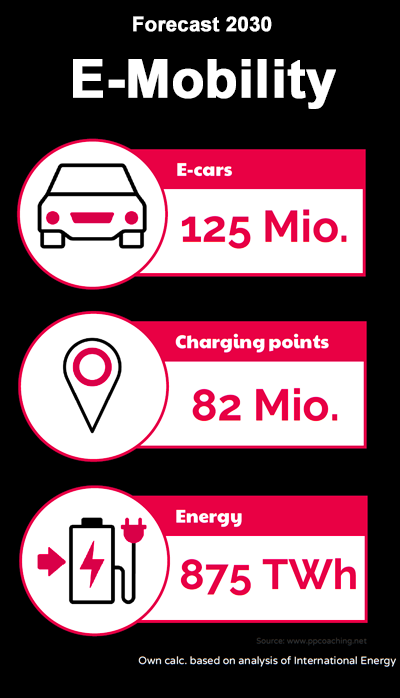Optimum performance for chargers
Rittal offers suitable enclosure solutions for charging pillars as standard enclosures for industrial applications or in bespoke designs.

As we all strive to reduce CO2 emissions and protect our environment, electromobility or e-mobility is being progressed on a global scale. A widespread charging infrastructure is an absolute must have prerequisite to meet the electromobility goals that have been set. 2024 was a landmark turning point for the auto industry because almost every automotive manufacturing company across the world accelerated its efforts to increase its e-mobility offering.
Electromobility will change how we go about our everyday lives and will have a radical impact on how we refuel/recharge our vehicles. In most cases, vehicles will not be charged in charging centres (similar to filling stations), but simply wherever they are parked – be that at work, home or even at the supermarket. Charging infrastructure is required, therefore, wherever vehicles are parked which means that charging capability needs to be established and visible in our everyday surroundings.
- - - Recording from 12.05.2021 available - - -
You have missed our live webcast?
Then take a look at the recording of our webcast. We will show you how to configure the right power supply for your charging infrastructure in simple steps, including design approval and all with certified components.
Electromobility is clearly picking up speed – not least thanks to subsidies from the German government. The expansion of charging networks is actively helping to mitigate some of the current issues of range, infrastructure and costs.
But how does the electricity actually get to the charging station? Rittal supports the configuration of a tested low-voltage main distribution system for your charging centre with the software Power Engineering. Whether you are planning a multi-storey car park, a network of rapid charging stations or a car park for your employees and customers – Rittal offers everything from a single source from Power Engineering software to all the system components required to complete such a project.
Presenters
 |
 |
|
|
Ilker Boyacioglu |
Dirk Rudolf Hecker |
Given how closely intertwined charging centre infrastructure will become in our day-to-day lives, the demand for them is clear. Offering IK-rated impact protection and electromagnetic compatibility (EMC) shielding, our enclosures help keep you safe and secure.
Our white paper brings you up to date on the latest developments, providing you with information about test procedures, statutory requirements and applicable standards to be complied with.

Most charging centres for electric vehicles comprise a transformer station, an outdoor battery storage unit (depending on the layout), a low-voltage main distributor, infrastructur enclosures for the power electronics and the charging pillars themselves.
Rittal offers the ideal solution for all components.
The set-up is not affected by a charging station’s charging capacity, which can be up to 22 kW per charging point in the normal charging range, greater than 22 kW per charging point in the rapid charging range, and 150+ kW per charging point in the high-power charging range.
Rittal offers suitable enclosure solutions for charging pillars as standard enclosures for industrial applications or in bespoke designs.
The transformer station is where the current from the medium-voltage network is converted into the electric voltage used by low-voltage networks. Low-voltage main distributors with Ri4Power and the RiLine portfolio from Rittal are ideal in this circumstance.
In addition to solar and wind power, electromobility can also be powered by fossil fuel sources. Rittal supplies turnkey system solutions and control cabinets for wind farms and generator terminal boxes for solar panels.
If the power density of a battery starts to give out to the extent that the electric vehicle can no longer rely on an adequate power supply, the battery can instead be used for example as an alternative power supply for a charging station itself. Depending on its purpose, these batteries are housed in either an indoor or outdoor enclosure.
The power electronics provide the supply for multiple charging points and therefore need to be well protected. Various climate-control solutions and installation with 19" mounting frame and assembly plates can be implemented in one secure housing.
One container for everything. To establish a complete energy storage infrastructure, Rittal offers preassembled containers with everything from racks and battery mounts to the required climate-control systems.
Rittal offers suitable enclosure solutions for charging pillars as standard enclosures for industrial applications or in bespoke designs.
One container for everything. To establish a complete energy storage infrastructure, Rittal offers preassembled containers with everything from racks and battery mounts to the required climate-control systems.
If the power density of a battery starts to give out to the extent that the electric vehicle can no longer rely on an adequate power supply, the battery can instead be used for example as an alternative power supply for a charging station itself. Depending on its purpose, these batteries are housed in either an indoor or outdoor enclosure.
The transformer station is where the current from the medium-voltage network is converted into the electric voltage used by low-voltage networks. Low-voltage main distributors with Ri4Power and the RiLine portfolio from Rittal are ideal in this circumstance.
In addition to solar and wind power, electromobility can also be powered by fossil fuel sources. Rittal supplies turnkey system solutions and control cabinets for wind farms and generator terminal boxes for solar panels.



Do you want to find the right enclosure solutions for your charging centre’s requirements quickly and easily?
Our product finder helps you do just that.
No matter whether your application is indoors or outdoors, front-end or back-end, wall-mounted or free-standing – Rittal provides the right enclosure.

If you have any questions about electromobility or charging infrastructures, there are many ways you can get in touch with us.
Feel free to send us an e-mail, give us a call or use our contact form. We look forward to hearing from you!
Your contact person:
Mrs. Verena Freund
+ 49 (0) 2772 - 505 1513
E-Mail: freund.v@rittal.de